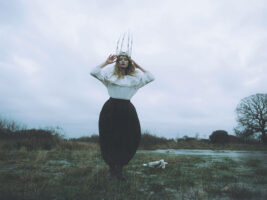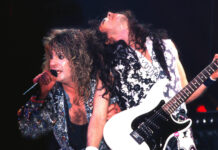
Meet Paris Paloma, the folk-pop artist channelling mythology, feminism and chaos to shape her own world in her music
Last year, Paris Paloma took TikTok by storm with her song Labour, which explores the unfair demands placed on women over percussive acoustic strumming and swirling layers of vocals. It’s not surprising that the singer-songwriter came to music after an interest in both visual art and creative writing. It was Ed Sheeran’s debut album + that inspired her to pick up the guitar at age twelve or thirteen. “I had a lot in me that I wanted to get out creatively,” she tells Guitar.com. “I’ve been doing art for a long time before I was doing music and music seemed like this wall that was difficult to get into. But people like him definitely made it seem incredibly accessible.”
READ MORE: Indie-surf-punks Sun Room were thrown in at the deep end, but they’re riding the waves
Around that time, her grandmother bought Paloma her first guitar, a half-size travel one, from an independent music shop while on a trip to Jersey. “I self-taught for a little while, and then I got lessons,” she says. “But that was the start of my instrumental musical journey. I still don’t read any sheet music so when I did music GCSE, I used Logic instead of Sibelius to do my composition piece and made a dance track. And it was super fun. I just do everything by ear.”
She held onto her interests in art and writing, and they still play a role in her music. “What I love about being a creative is the element of being heard… All anyone’s trying to do as a creative is to convey something that they feel is important,” she explains. “And in order to convey that you want to use every tool that you have.” Paloma, who has a degree in visual art, remains involved in her music videos. “It’s such a big part of the visual world, I always really want to have a very active role in the artistic direction that it’s going in,” she says.
Those visuals have helped establish the landscape for her debut album, Cacophony, arriving August 30. “Building a world, having it be immersive – it’s the act of empathy which then, by extension, enables the people who listen to it to feel held by it, to feel represented, to feel empowered, or comforted,” she says.
Image: Press
Were there any specific guitars or even gear that you liked writing on or liked recording with for this album?
“We have a beautiful rubber bridge guitar that we used for drywall and a couple of other songs… [I’ve] been given a really beautiful rubber-bridge by Taylor, which is really nice of them. Along with my normal Taylor, which I adore and take everywhere. It’s not broken yet… It’s my favourite thing.”
With the sound, it starts off very intimate, and then it builds into this bigger thing… I feel like that’s what your songs do. It’s grounded in real experience, but then it builds this mythological and fantastical world around that. How did you go about constructing that?
“I think that happens very naturally as I’m gauging what level of realism I want to give the stories that are based in my biography. I’m quite a private person whilst being very vulnerable in songwriting, and most of the people I look up to are also like that, where they’re the most vulnerable songwriters, but they know the context in which they want to deliver that vulnerability.
“People like Hozier, or AURORA, they’re some of my biggest influences and that’s how they operate. So where the myth and the legend and the world-building comes in, that’s what that is to me. It also gives this platform to the human stories that I’m telling, which I think is the whole point of songwriting sometimes. It’s giving platform, it’s giving validity and a space for really vulnerable human things.”
Image: Press
Were there any influences on the mythological or the literature side?
“I love Madeline Miller as a writer and her two books, Circe and [The] Song of Achilles, are two of my absolute favourites. Circe inspired a lot of the world-building and setting of Labour in the island and this domestic paradise that Labour talks about. Mythos by Stephen Fry is such a wonderful account of Greek mythology. He talks in the first chapter about the Greek creation myth of chaos and that partially inspired the naming of the album, Cacophony, this idea of creation springing out of chaos and the way he describes it like this yawning void, this chasm of noise and darkness and chaotic things and cacophony of sounds – that’s what the inside of my head felt like.
“The album is a result of writing music in order to cope with that, or in order to make sense of that chaos. There’s a couple of other books like Mona Chollet’s In Defence of Witches: Why Women Are Still On Trial. That’s a book I adore. It’s a really accessible and wonderful read that talks about modern-day feminism and modern-day patriarchy, but related to the witch hunts and the ways in which the witch embodies modern-day archetypes of women as well. That is a book that’s really closely linked to songs on the album like as good a reason or knitting song, where it’s more overtly to do with communities of women and individual women in responding to patriarchy.”
Labour went viral on TikTok a year ago. What was it like gearing up to release this album following that?
“Really intentional, because the response that Labour had was a big factor in deciding to do an album. Because prior to that, I might not have thought that I was ready to release a body of work, but Labour was the kind of thing where it was so big, it felt like anything else would have been dwarfed by it.
“I was like, it’s time, I need to release a body of work and release these songs that I’ve been working on. So it’s felt like I’m really retroactively in the album coming up to meet the massive response that it’s had. Labour’s one song. This is a whole body of work of all of these songs that have been immensely empowering to make and vulnerable to make.”
I also read that mythology impacted the structure of the album, if that’s correct, that it was structured like a quest narrative?
“The album tells the story of my emotional growth, my emotional development and journey through adversity. It kind of reflects the literary trope of the hero’s journey, and it begins in this moment of great pain and tragedy and calamity and moves through the presence of an antagonist, and then the presence of a mentor, or a source of external love and reaches this really dark third act before finding the peace and warmth at the end of the album… Half of the songs were written by the time I decided to do an album… It was a really emotional exercise to curate this album from the last two years, which has been a really emotionally-charged period for me.”
Cacophony is out now via Nettwerk
The post Meet Paris Paloma, the folk-pop artist channelling mythology, feminism and chaos to shape her own world in her music appeared first on Guitar.com | All Things Guitar.
Source: www.guitar-bass.net













